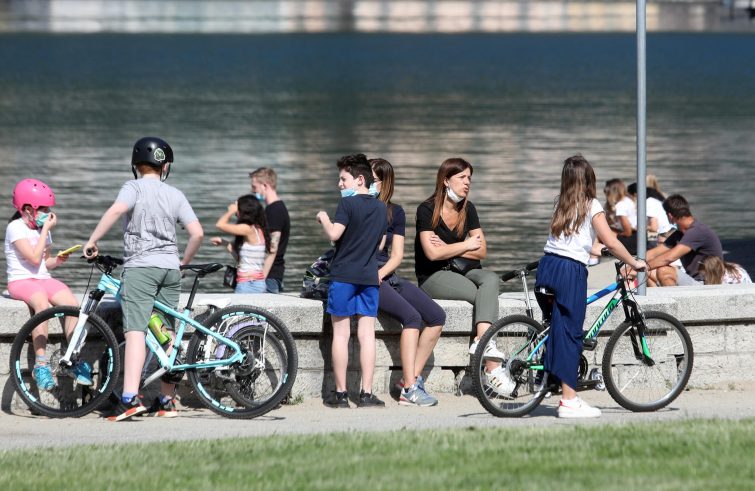
The greater the level of autonomy gained during childhood, the more a teenager will be balanced and self-confident. Autonomy creates security, according to Stefano Vicari, Professor of Child Neuropsychiatry at Rome’s Cattolica University, Director of the Child and Adolescents Neuropsychiatry Unit at the Bambino Gesù paediatric hospital in Rome. “We are often concerned about our children’s physical wellbeing, without realising that fostering their healthy psychological development is just as important.”
 How? Professor Vicari lays out the facts in his concise book entitled, not by coincidence, “Bambini autonomi, adolescenti sicuri- Crescere i nostri figli nel benessere mentale” (“Autonomous children, safe adolescents”; subtitle: “Raising our children in psychological well-being”), published by Lswer. A comprehensive handbook for parents, from prenatal care, with advice on right and wrong behaviours during pregnancy, until adolescence. Not surprisingly, the title of the final chapter is “Adolescence: survival instructions for children and parents”. Indeed, Vicari accompanies parents throughout their children’s upbringing and growth, starting with the emotional and psychological development of the child and analysing the critical stages and educational choices that may affect their psychological well-being. The objective, he told SIR, is
How? Professor Vicari lays out the facts in his concise book entitled, not by coincidence, “Bambini autonomi, adolescenti sicuri- Crescere i nostri figli nel benessere mentale” (“Autonomous children, safe adolescents”; subtitle: “Raising our children in psychological well-being”), published by Lswer. A comprehensive handbook for parents, from prenatal care, with advice on right and wrong behaviours during pregnancy, until adolescence. Not surprisingly, the title of the final chapter is “Adolescence: survival instructions for children and parents”. Indeed, Vicari accompanies parents throughout their children’s upbringing and growth, starting with the emotional and psychological development of the child and analysing the critical stages and educational choices that may affect their psychological well-being. The objective, he told SIR, is
“to enable the child to grow into an adolescent whose strength and resilience will enable him/her to face the challenges posed by his/her age and the various circumstances of everyday life”
The book begins with an introduction on the cognitive abilities of nascent and newborn babies. It then goes on to analyse learning and development processes, with a special focus on emotion management. The quality of sleep, relationship with food and language development are among the topics covered, all set against the backdrop of autonomy in early childhood education, which “is not about abandoning a child, but about holding their hand and teaching them to manage on their own.”
Autonomy, he cautions, ” is synonymous with self-discipline – rules help children to gradually adapt to different circumstances and above all to other people -, self-control, one of the pillars of good mental health, and responsibility”.
In short, we must not give in to ‘having it all and having it now’: we must teach children to manage their expectations and frustrations.
Few but strict rules.
 “All actions that could cause damage to the child, to others, to the environment, must be prohibited,” said the neuropsychiatrist. “Once these limits have been set, the child must be left free, in accordance with their developmental stage, to learn and face the consequences of their actions.” Practical advice and recommendations are given for each stage of growth, ranging from temper tantrums to identifying early signs of malaise which, if neglected, could develop into mental disorders, and how to deal with them. “The most serious and disabling mental disorders, wrongly believed to be typical only of adulthood, appear during childhood and adolescence.” That is why it is so important to prevent them, or at least to recognise them early enough to provide timely treatment.
“All actions that could cause damage to the child, to others, to the environment, must be prohibited,” said the neuropsychiatrist. “Once these limits have been set, the child must be left free, in accordance with their developmental stage, to learn and face the consequences of their actions.” Practical advice and recommendations are given for each stage of growth, ranging from temper tantrums to identifying early signs of malaise which, if neglected, could develop into mental disorders, and how to deal with them. “The most serious and disabling mental disorders, wrongly believed to be typical only of adulthood, appear during childhood and adolescence.” That is why it is so important to prevent them, or at least to recognise them early enough to provide timely treatment.
Emotional education, i.e. the ability to understand and manage feelings, is fundamental, according to the expert. In this context, Vicari describes a range of real-life scenarios and addresses the parents directly:
“Don’t judge, and above all, don’t humiliate or mock your child. Instead, welcome him/her with care even when they are displaying negative feelings such as anger, which should not be repressed but understood.”
Negative emotions can be channelled into healthy and constructive options for older children: “dancing, playing an instrument, painting, writing or practising a sport.” In all cases, children must be guided towards emotional self-regulation. Our example, combined with caring and supportive presence, ‘is the most precious tool.” “It appals me to see parents engaged in long phone conversations or endless chats while carelessly trying to interact with their children,” remarks the neuropsychiatrist. He adds, addressing them directly: ‘There are precious moments like breastfeeding your child, offering comfort or laughing with them that should be treated as something sacred, unrepeatable, deserving protection from other people’s interference.”
Finally, the “tempests of adolescence” linked to changes in physical and intellectual development and the child’s self-perception, along with the struggle to find the right balance between an inclination to run risks and sensation-seeking behaviour. It’s a complex transitional period, fraught with pitfalls in which family, school and peers “play a crucial role, both in providing positive support and in hindering the attainment of appropriate self-awareness, emotional stability and, consequently, a reasonable degree of psychological well-being”.
Being there is key.
Being there, devoting time, heart and intelligence to children even in a strained relationship.
“Nowadays, young people say that they feel lonely, abandoned, and they are anxious about their present. Our presence can help them overcome what for them is a very difficult period”.
Vicari devotes a chapter of the book on the most common psychopathological disorders in childhood and the alarm bells that need to be heeded, and urges parents, teachers, educators and paediatricians to remain vigilant. In case of doubts, there is no time to waste: seek the help of a specialist for reassurance or for prompt and qualified assistance.













